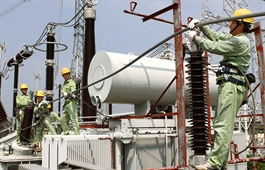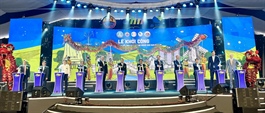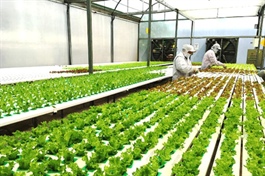IEEFA: Viet Nam’s manufacturing future rests on a credible renewable energy game plan
IEEFA: Viet Nam’s manufacturing future rests on a credible renewable energy game plan
The Vietnamese economy’s unparalleled exposure to multinational corporations and the global consumer market calls for a pragmatic alignment between the country’s renewable energy strategy and the decarbonisation commitments of the global brands, according to IEEFA’s latest report on Viet Nam.

“Multinational corporations responsible for up to US$150 billion of Viet Nam’s export revenues have made specific pledges on carbon neutrality or decarbonisation of varying scope and timelines,” said Thu Vu, energy finance analyst leading the Vietnamese market coverage for IEEFA.
“These brands’ journey toward sustainability progress is one in which Viet Nam can not afford to ignore or miss out on.”
Viet Nam is currently the largest exporter of goods in developing Southeast Asia. With nearly 60 per cent of the exports being manufactured goods for the big brands, its growing role in the global supply chain comes with the pressure to be attuned to the brands’ needs and preferences.
In the report, Thu describes the macroeconomic spillover effect of a solid renewable energy adoption plan in Viet Nam, as well as the key drivers that will shape the sector’s next stage of growth.
“Solar and wind power is no longer a sole matter of incremental power supply, but also an insurance policy for jobs, hard currency earnings, economic growth, and a conduit for sustainable investments,” she said.
“Unlike the past, this decade’s revenue streams will rest on the country’s ability to plug factories to a low-carbon grid.”
Corporate demand for clean energy
Prime Minister Pham Minh Chinh committed Viet Nam to a 2050 net-zero carbon emissions target at the 2021 United Nations Climate Change Conference just as international consumer brands, many of whom have supplier clusters in Viet Nam, are making supply chains’ emissions reduction front and centre of their decarbonisation strategy.
Companies such as Nike and Apple have been prominent advocates of an ambitious and robust clean energy adoption plan in Viet Nam, have asked the government to enable their suppliers’ factories access to clean energy options, said Thu. “For these corporates, getting clean power is less about immediate cost savings.”
She explained that this was part of a wider, more pressing carbon footprint reduction effort, without which their bottom lines, ability to access lower-cost capital, and reputation would be put at risk.
Manufacturers push ahead with renewable energy adoption
Greater focus on corporate clean energy needs can be seen in the rapid growth of distributed renewable power solutions, such as commercial and industrial (C&I) rooftop solar systems, for which the government and state utility Viet Nam Electricity (EVN) have expressed continued support.
“These systems help ease demand, grid congestion, and relieve EVN of the pressure of developing and funding new capacity,” she added.
She noted that Viet Nam’s C&I rooftop solar segment had been quietly driving capacity growth this year amid the temporary policy freeze on utility-scale projects. “Developers and their financiers, which have successfully adjusted their business models to become largely independent of state subsidies, are tapping into the country’s largely under-served and growing industrial space.”
High-profile investors are entering this market, such as the French utility group EDF and South Korean conglomerate SK Group. Both have formed joint ventures with local partners, each pledging over $100 million in investment over the next few years.
Eco-industrial parks are also gaining traction in Viet Nam, with the owners proactively exploring clean energy solutions to lure ESG-conscious tenants. Sembcorp-backed Viet Nam Singapore Industrial Park’s expansion in Binh Duong Province recently announced that it would develop an onsite solar farm to power its tenants, including the upcoming first carbon-neutral factory of Danish toymaker Lego.
The government has been undertaking regulatory and technical preparatory work for an offsite corporate renewable energy procurement scheme, also known as the Direct Power Purchase Agreement (DPPA). This is highly anticipated by energy-intensive corporate consumers who lack access to adequate onsite renewable resources.
DPPAs are expected to be deployed in 2023-2024 with an initial cap of one gigawatt (GW) capacity. “The charm of DPPA is that it relieves EVN of tariff pressures,” she said.
























